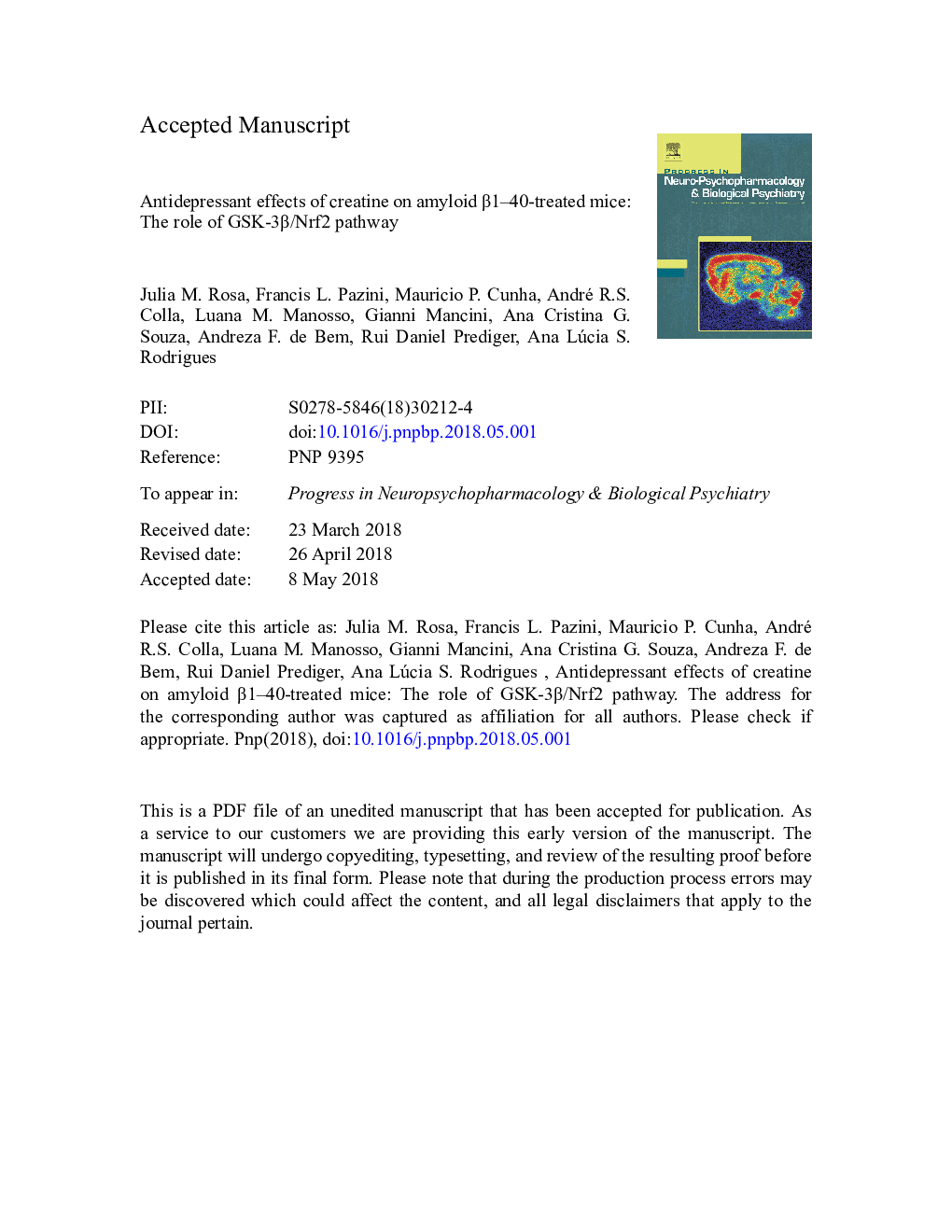| کد مقاله | کد نشریه | سال انتشار | مقاله انگلیسی | نسخه تمام متن |
|---|---|---|---|---|
| 8537260 | 1561007 | 2018 | 41 صفحه PDF | دانلود رایگان |
عنوان انگلیسی مقاله ISI
Antidepressant effects of creatine on amyloid β1-40-treated mice: The role of GSK-3β/Nrf2 pathway
دانلود مقاله + سفارش ترجمه
دانلود مقاله ISI انگلیسی
رایگان برای ایرانیان
کلمات کلیدی
موضوعات مرتبط
علوم زیستی و بیوفناوری
علم عصب شناسی
روانپزشکی بیولوژیکی
پیش نمایش صفحه اول مقاله

چکیده انگلیسی
Alzheimer's disease (AD) is characterized by progressive synaptic dysfunction and neuronal lost in specific brain areas including hippocampus, resulting in memory/learning deficits and cognitive impairments. In addition, non-cognitive symptoms are reported in AD patients, such as anxiety, apathy and depressed mood. The current antidepressant drugs present reduced efficacy to improve depressive symptoms in AD patients. Here, we investigated the ability of creatine, a compound with neuroprotective and antidepressant properties, to counteract amyloid β1-40 peptide-induced depressive-like behavior in mice. Moreover, we addressed the participation of the intracellular signaling pathway mediated by glycogen synthase kinase-3β (GSK-3β)/nuclear factor erythroid-2-related factor 2 (Nrf2) in the creatine effects. AÃ1-40 administration (400â¯pmol/mouse, i.c.v.) increased the immobility time in the tail suspension test and decreased the grooming time and increased latency to grooming in the splash test, indicative of depressive-like behavior. These impairments were attenuated by creatine (0.01 and 10â¯mg/kg, p.o.) and fluoxetine (10â¯mg/kg, p.o., positive control). No significant alterations on locomotor performance were observed in the open field. AÃ1-40 administration did not alter hippocampal phospho-GSK-3β (Ser9)/total GSK-3β, total GSK-3β and heme oxygenase-1 (HO-1) immunocontents. However, AÃ1-40-infused mice treated with creatine (0.01â¯mg/kg) presented increased phosphorylation of GSK-3β(Ser9) and HO-1 immunocontent in the hippocampus. Fluoxetine per se increased GSK-3β(Ser9) phosphorylation, but did not alter HO-1 levels. In addition, AÃ1-40 administration increased hippocampal glutathione (GSH) levels as well as glutathione reductase (GR) and thioredoxin reductase (TrxR) activities, and these effects were abolished by creatine and fluoxetine. This study provides the first evidence of the antidepressive-like effects of creatine in AÃ1-40-treated mice, which were accompanied by hippocampal inhibition of GSK-3β and modulation of antioxidant defenses. These findings indicate the potential of creatine for the treatment of depression associated with AD.
ناشر
Database: Elsevier - ScienceDirect (ساینس دایرکت)
Journal: Progress in Neuro-Psychopharmacology and Biological Psychiatry - Volume 86, 30 August 2018, Pages 270-278
Journal: Progress in Neuro-Psychopharmacology and Biological Psychiatry - Volume 86, 30 August 2018, Pages 270-278
نویسندگان
Julia M. Rosa, Francis L. Pazini, Mauricio P. Cunha, André R.S. Colla, Luana M. Manosso, Gianni Mancini, Ana Cristina Guerra Souza, Andreza F. de Bem, Rui Daniel Prediger, Ana Lúcia S. Rodrigues,